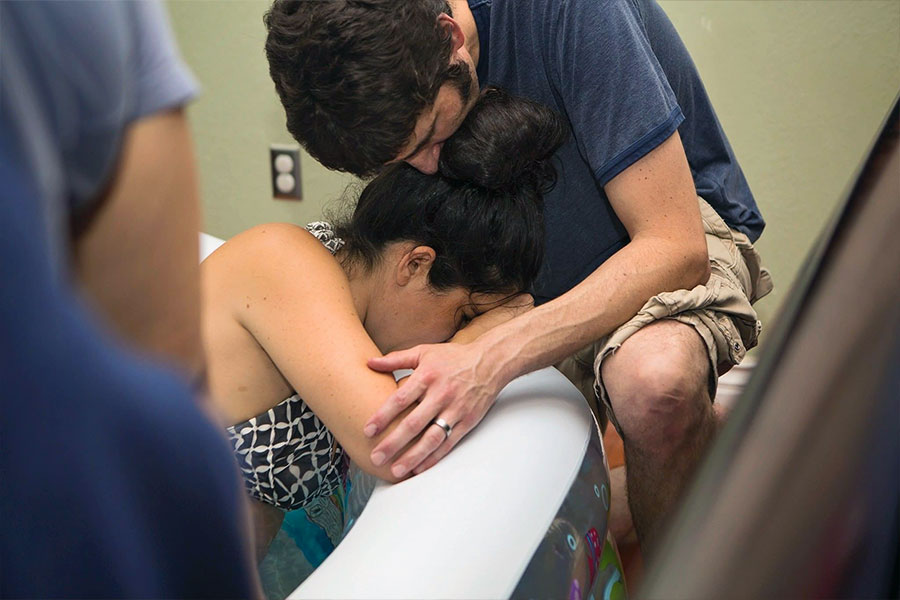Midwives specialize in normal birth. That means we could serve approximately 85% of birthing families in our communities. You may be wondering, “Is homebirth right for me?” Women and families need to feel comfortable in the birth setting they choose. Find the one that works best for you.
“I decided to do a home birth for my third baby after feeling disappointed with my first two hospital birth experiences. And what a difference it was! I feel so lucky to have been under the care of San Diego County Midwives. They are true professionals with extensive knowledge and experience in all things birth!”
– Anna G.



Home Birth vs. Birth Center vs. Hospital
While birth may seem like only one day in a woman’s life, the overall impact on how she is treated during that process have long-term implications on her style of mothering, her self-confidence, and how she feels about her body, her partner and her baby.
This is a very large statement, but for over 30 years of data that proved this point. This feeds into the reasons families choosing to birth at a hospital really should consider having a doula. The doula can be the constant in room of changing care-providers whether that is the nurses or physicians.
If a family chooses birth center, their care is more personalized than the institutional setting. However, the woman may not have the midwife they would prefer depending on who is on shift when she goes into labor.
When a family chooses home birth, they typically select a midwife team they are assured of having at their birth.
In both birth center and home birth, the family is at the center of the care. They collaboratively decide together what is important to them. They are well informed of the risks, benefits, and alternatives that might arise. They have researched their options, generally been offered evidence based data and make decisions based on their risk factors.
Community birth (home and birth center) is reserved for low risk women and pregnancies. Any family that experiences “high risk” pregnancy and medical conditions that require intensive fetal monitoring are safer in tertiary care centers (hospitals) that specialize in sick mothers and babies.
So, yes, where and how you give birth can make a difference in your mothering of your family. Even high risk pregnancies can have a high degree of patient involvement.
Every birthing person deserves the dignity of being the center of the event. That includes being included in the discussion, decision making and ultimately the outcome of the experience.
Benefits of working with a solo midwife
When you work with a solo midwife like Heather, you will enjoy continuity of care. She will be there with you throughout pregnancy, birth, and postpartum. You will develop a unique relationship often referred to as the “midwife-mother” relationship. You and Heather will get to know one another, which helps her to adjust her care according to your needs. This relationship creates a more comfortable atmosphere during visits where questions and concerns are more readily expressed.
Schedule A Consultation
What is considered a high and low risk birth?
Most women experience “low risk” pregnancy and birth. There are certain medical conditions that make pregnancy “high risk”. These include, but are not limited to Type 1 Diabetes, history of primary hypertension, heart disease, gestational diabetes not controlled by diet and exercise, possible genetic disorders in the pregnant woman.
What happens if I become classified as “high risk” under your care?
There are some pregnancies that trend from healthy to “high risk”. Midwives are trained to assist pregnancies remain in the healthy range. We may use referrals to other specialists including physicians. If the risk issues are resolved and the pregnancy comes back within normal, the midwife will resume care.
If the pregnancy remains high risk, the midwife can continue to support the family for supportive care while the woman will be cared for by her physician. High risk pregnancies truly benefit from the medical knowledge, expertise and technology provided in the institutional setting. If we have cared for you through the majority of your pregnancy, we would love to support you in your hospital birth as a labor support person. We cannot continue to be your primary care provider. We also offer postnatal home visits during the first few weeks after your birth.
Late Transfers
Can I transfer my care to you late in my pregnancy?
Some families don’t find out about midwifery care until well into their pregnancy. We do accept clients who have received care during their pregnancy and are interested in changing their birthing venue. Midwifery care is based on collaborating with the family. That is best accomplished when we have time together to get to know your needs and desires.
First we review your medical records and determine that you are experiencing a low risk pregnancy and are a good candidate for midwifery care. Then we spend time helping you learn your options, listening to your views, opinions, research and coming up with a care plan tailored to your specific needs.
What is the latest you will accept a new client?
We feel comfortable taking on clients up to 30 weeks of pregnancy. If women come to us later than this, we review each case individually.
Home Birth Safety
Is home birth safe?
While birth is generally safe, this can vary depending on the health of the woman, the baby and the pregnancy. Home birth is reserved for healthy women and healthy pregnancies.
Do midwives prepare blood for transfusion in advance just in case there is a complication?
Neither birthing centers nor midwives specializing in home birth carry blood or administer blood transfusions. This is a highly medicalized process that requires typing and cross-matching per individual patient. This advanced life support are not necessary for normal birth in low-risk women. We do carry IV supplies and administer as necessary. Volume expanders are the first line of defense when excessive blood loss is experienced. If the use of medications and additional fluid replacement via IV therapy do not sufficiently stem a hemorrhage, then emergency medical services (EMS) would be activated. Midwives are trained to provide both manual and bi-manual compressions to stop excessive bleeding if these previously noted methods prove insufficient.

Home Birth Package
Personalized Prenatal Visits
- Each of your private prenatal appointments with your midwife averages 45min-1hr per visit.
- We follow the traditional prenatal schedule of visits which is monthly until 28 weeks, bimonthly till 36 weeks and then weekly until the birth.
8 – 12 Weeks (Initial Visit)
Initial office visit includes completing your history and physical exam. Any necessary labs will be drawn unless you have already had them with your previous care provider.
Your initial visit may be later depending on when you start care or transfer into the practice.
Nutritional consult will be scheduled approximately two weeks after the Initial Visit. Monthly in-person visits are scheduled thereafter until
28 Weeks
Glucose & repeat complete blood count (CBC) (every 2 weeks)
36 Weeks
Labs – repeat CBC, syphilis, chlamydia, and gonorrhea
GBS & gen culture at 36 – 37 weeks (weekly from 36 – 41 weeks)
41 Weeks
2 Non-Stress Tests (NST) and a Biophysical Profile Test (BPP)
Birth Team Meeting
- An hour long Birth Team Meeting in your 36th week at your home.
Labor, birth, and immediate postpartum nursing care for mom and baby
- Heather will attend your labor and birth. One or two fellow midwives will also be present during birth and immediately postpartum.
Postpartum Visits
- 24 – 36 hours: Home visit by your midwife
- Day 3 – 4: Home visit by your midwife
- Week 2: Office visit
- Week 4: Office visit
- Week 6-8: Office visit
- Additional postpartum visits are available on an as needed basis.
Well Baby Care:
- We assess your baby’s vitals and weight gain during our postpartum visits.
- These visits do not replace your regular pediatric visits.
Lactation:
- We will assist you with general lactation support at the postpartum visits. If additional lactation support is necessary, we are happy to provide you with a list of qualified IBCLCs.
- Every Thursday (10am-11am) we offer a free Breastfeeding Support Group. This is open to all mothers in San Diego County.
Excluded services
Our fees don’t include some medications or any referred services such as ultrasounds, laboratory tests, physician consultation visits, lactation consultants, hospital services, childbirth classes, etc.
Please note: we are NOT Pediatricians. We encourage all our families to have their newborns assessed by their own Pediatrician or Doctor of your preference within the first 7 days of life. We will refer you to a pediatric provider with any concerns.
Home Birth Package Prices
Includes: Complete midwifery care as well as a discount if you are a Medi-Cal or TRICARE member.
The price shown above is your out-of-pocket expense.
Includes: Complete midwifery care and a discount for paying by your third visit.
The price shown above is your out-of-pocket expense.
Includes: Complete midwifery care for home birth.
The price shown above is your out-of-pocket expense.
“I cannot say enough thank you’s to y’all for the excellent care we received. Cooper & I are so lucky to have had you at our birth. We love you gals!”
-Amy and Cooper
Further Reading
Differing Stances: “We feel the differences in position statements are largely the end product of significant confirmatory bias.”
Fewer Interventions: “What does seem clear, however, is that women undergo fewer interventions when delivering at home.”
Midwife Attended Births: “Planned home birth attended by a registered midwife was associated with very low and comparable rates of perinatal death and reduced rates of obstetric interventions and other adverse perinatal outcomes compared with planned hospital birth attended by a midwife or physician.”
© 2025 San Diego County Midwives
San Diego County Midwives have either authored or reviewed and approved the content on this website.
Disclaimer of Medical Advice: All users of this website are responsible for their own medical care, treatment, and oversight. All of the content provided on the website is for informational purposes only and does not constitute the providing of medical advice. It is not intended to be a substitute for independent professional medical judgment, advice, diagnosis, or treatment.
Privacy Policy | Terms of Use | Sitemap | Accessibility Statement






